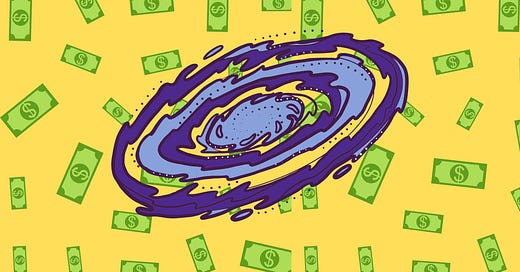M26: Reality Media 10. Pricing Everything
What’s the price of the Andromeda Galaxy? How much does the smell of the first summer rain cost?
When we say some things are priceless and for everything else there’s Mastercard, we mean that some things are sacred and can’t be priced. But there’s another problem for pricing mechanisms: how to price objects that are either too large, too small or too fleeting to acquire measurable value.
These are important questions because we may soon have to price things that are well beyond the human scale. I am sure there will be a carbon futures market in which people will trade carbon emissions. At the other end, if we financialize our guts, people with rich microbiota will be able to trade their colon bacteria on the open market. Think about this way: if you view your body as a factory that has inputs and outputs, we are currently centered around I/O that’s at the human scale - food goes in, labor goes out. But a fine grained market system might trade between my kidney and your guts.
Feels dystopian?
The pricing revolution seems inexorable and to achieve those goals, it needs ideas and mechanisms of money that are more subtle and adaptive than the ones we have today.
Ready or not, Prasad’s book is a survey of the future of money. That’s this book.
Notes on Prasad
Money used to synonymous with cash, but that’s changing rapidly. I have almost stopped using cash in the US. I went to the ATM exactly once in 2021. Cash is on its way out.
Which tells you that money is more abstract than any representation of it: it can be coins, gold, cash, bitcoin or whatever comes in the future.
As with fossil fuels, American dominance is predicated on the dollar being the world’s reserve currency, which could lead to conservatism when it comes to financial innovation (that’s probably a good thing!).
The key issue in any kind of coordination problem is trust. The computational style allows us to scale trust in two complementary ways: either through reputation management and other forms of social control - when everyone has smartphones, I can loan you money and message all your friends that I have done so - or take out the human element altogether and do it algorithmically, i.e., crypto. One is for the poor, the other for the rich.
Crypto gets the lion’s share of the press when it comes to financial revolution, but that’s only one aspect of the profound transformation taking place. For example, the fact that NATO countries could agree upon punitive sanctions on Russia, including their Central Bank in just a few days, shows that we live inside a profoundly integrated monetary system with previously unheard of surveillance mechanisms.
Rapid transition is easier in the shadow of important events such as the crash of 2008 and the Ukraine war. Crypto could be how Russia (and perhaps China in the future) rides out Western sanctions. That’s why the major western crypto exchanges have refused to ban Russian accounts.
Why would they: their biggest Russian competitor (the Russian Central Bank, in case that wasn’t obvious) has been taken out. Make hay while the sun shines. Speed and scale are already the norm in the global financial system. The competition is over how these systems will be commoditized via technology (and which tech). The biggest question:
Will fiat currency be replaced by something else?









